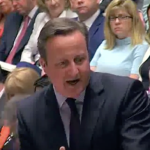I was in Australia when the UK general election took place. I can’t say I was looking forward to coming back to an educational landscape that would allow the Conservative government unfettered control over educational policy, especially after having had a month of (largely) positivity and optimism from teachers and school leaders all over Australia.
That’s not a criticism of English educators: their morale has been the subject of a particularly energetic version of ‘Whack-A-Teacher’ by successive governments for a couple of decades at least. But the Michael Gove-led assault on their integrity and motivation was barely ameliorated by the Lib Dems, and now that they’ve got a majority, even the more acceptable face of Nicky Morgan is on the warpath – this time, it’s so-called ‘coasting’ schools that are bearing the brunt. We’ll come to what constitutes a coasting school in a moment, but it’s worth looking at the impact these strategies are having on the profession.
In 2005, 20% of newly-qualified teachers had left the profession within a year. By 2011, those leaving within a year had risen to nearly 40% – within a year. Current figures aren’t available, but I suspect the picture now is even worse. We do know that half of all new teachers have left within five years. Morgan and school reform minister, Nick Gibb, insist that students behaving badly is driving NQTs out of teaching. The OFSTED boss, Michael Wilshaw agrees with this analysis. When teachers themselves are asked why they are thinking of leaving, bad behaviour features in only 25% of responses; 76% blame workload – and one-in-three blame ‘teacher bashing’. Silly teachers – they don’t even know their own minds. Despite the fact that teacher vacancies rose by 30% in 2013 Nick Gibb insists there’s no recruitment crisis.
And so to this week’s morale-boosting announcement. Nicky Morgan has attacked ‘complacency’ in our school system: “for too long, a group of coasting schools, many in leafy areas with more advantages than schools in disadvantaged communities, have fallen beneath the radar.” But the criteria for coasting? Well, that will be based purely on exam results: 60% of good GCSE passes in secondary schools, and 85% achieving a level 4 in reading, writing and maths at primary level. Far from punishing schools in leafy suburbs, this will disproportionately affect schools in poorer, socially deprived areas.
Ms Morgan insists that she wants to see ‘an above-average proportion of pupils making acceptable progress.‘, but she’s blissfully unaware of the inherent bell-curve nature of norm-referenced standardised-testing (please read headteacher Tom Sherrington’s excoriating Maths 101 response). Laura McInerney provided a much more effective definition, and graphically laid out – as an ex-teacher – the impact Morgan’s coasting strategy will have upon the morale of teachers who need our support the most, and schools that find it hardest to attract new, enthusiastic teachers – those working in really tough circumstances.
Oh, but I forgot! We’re not allowed to ‘make excuses’ for the failure of kids living in low socio-economic areas to achieve their full potential. For that makes us ‘enemies of promise’. Never mind that the Joseph Rowntree Foundation study found that only 14% of low attainment can be attributed to school quality, the rest coming from a complex mix of cultural and socio-economic factors, most notably poverty. When you’re hell-bent on playing ‘whack-a-teacher’, the only poverty that matters is poverty of expectation (ours not theirs).
Hell, why not go the whole hog and abolish child poverty? Because that’s what this government seems intent on doing. Having seen that absolute child poverty has risen by half-a-million since coming to power, the government is doing what any self-respecting government would do: scrap the measures and abandon any targets. (If only they’d do that for school accountability, but it seems that there’s one law for them, and another for the rest of us).
Well, I’m sorry, but in a week where it’s taken an Australian to tell it like it is with this government (Thanks Adam) let me add my advice to ministers:
Child poverty is a thing. It actually exists, even though you’d rather re-define it away. Kids have lots of challenges due to the aforementioned poverty, or being newly-arrived in this country, or being carers – some will overcome them, but achieving ‘good’ exam results has to be seen in context. Saying that a teacher who has managed to educate a child who arrived with almost non-existent oracy, literacy and numeracy skills, and got them to get an ‘average’ pass mark, is a greater achievement than coaching a middle-class kid at an independent school to A-star results. Telling that teacher that they’re ‘coasting’ is an apalling insult.
The teacher recruitment crisis is a thing. Teacher morale is also a thing. It’s at an all-time low. If you keep going like this, the only teaching jobs being filled in this country will be at those independent schools.





